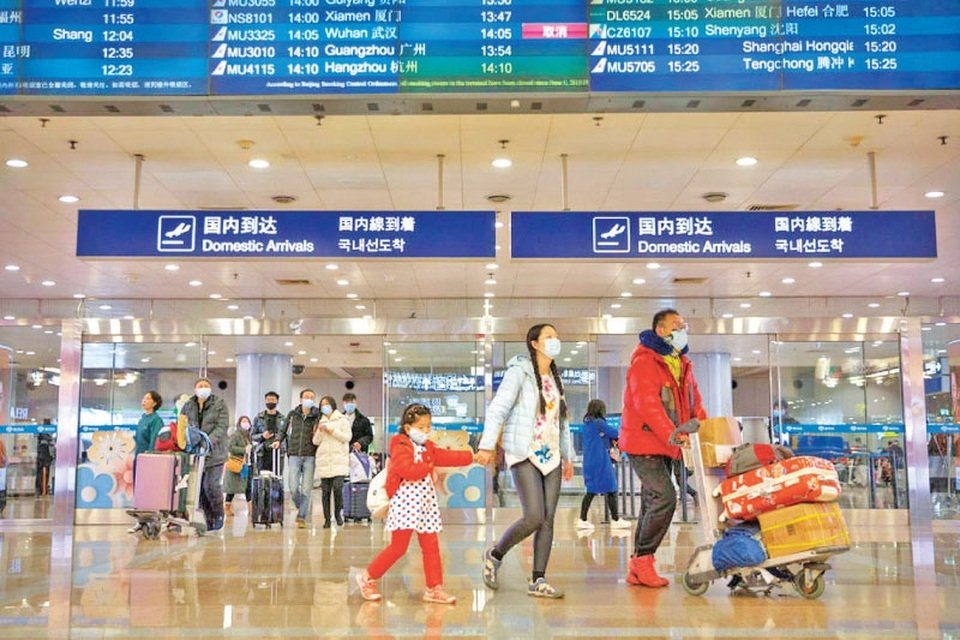(Dan Tri) – The flow of people returning to their homeland from new Covid-19 hot spots in Europe and the US is increasing the number of new infections in Asian countries.
Passengers at Beijing International Airport (Illustration: Daily News)
According to the Financial Times, the increase in imported Covid-19 cases across Asia has dashed hopes that the region has controlled the pandemic.
China, Singapore, Taiwan, and Hong Kong are among the countries and territories in Asia facing a new wave of Covid-19 cases, due to people from outside bringing in the virus.
China, where the virus originated late last year, confirmed that the country had no domestic infections on March 18, the first time since the outbreak.
However, China recorded 34 new infections from people who recently returned to the country.
According to BBC, Singapore yesterday announced 47 new infections, 33 of which were imported from abroad, of which 30 were Singaporean citizens returning to the country.
In South Korea, which has recorded the most serious outbreak in Asia outside of China, the emergence of new outbreaks and the risk of imported cases have made officials worried.
After several days of recording a decrease in the number of new cases, South Korea yesterday recorded an increase in new infections, with 152 cases, although it is unclear how many of them are imported cases.
“We believe the next 2-3 weeks will be very important,” said Yoon Tae-ho, a senior health official with the South Korean government.
Many countries and territories in Asia have seen success in controlling infections at home, but there have been concerns that the surge abroad could hamper their positive results.
Until the beginning of this month, Taiwan saw a relatively low rate of increase in new infections in the region, only 100 cases.
In Hong Kong, the number of infections also increased to 168 on March 17 from 116 on March 9, and nearly 90% of new patients had recently traveled abroad.
Don’t be subjective
Officials in China, South Korea, Taiwan and elsewhere in Southeast Asia are rushing to implement new measures due to a second wave of infections after several weeks of declining domestic cases.
Experts say the resurgence in infections shows the limitations of China’s widespread blockade, mass testing of the public and social distancing campaigns implemented.
But it also shows growing anxiety about new infections imported from abroad.
“What many people don’t realize is that this is just a temporary success, it’s not a sustainable success,” said Ben Cowling, a professor of epidemiology at the University of Hong Kong.
“There is a challenge to control as the number of imported cases increases from Europe, but in the future it could also come from other regions of the world,” he added.
China’s National Immigration Administration said earlier this week that about 120,000 people from abroad have returned/arrived in China every day since the World Health Organization (WHO) announced the Covid-19 pandemic on November 11.
More than a dozen provinces in China, from Beijing to border provinces like Yunnan, said all international visitors were quarantined for 14 days.
Taiwan also implemented a policy of banning entry to all foreigners and increasing quarantine measures for the island’s citizens.
In Hong Kong, students abroad were rushed home as the virus spread across Europe.
The number of new infections in Singapore, a country that has been praised for its quick action to control the epidemic, has increased nearly 90% to 314 cases in the past week.
`We predict there will be more imported cases, and therefore there will be new infection clusters and new waves of infection, this time coming from many countries, not just one or two anymore,`
Much of the epicenter of the epidemic has now shifted from Asia to Europe and the United States, but new figures on imported cases show that the pandemic is far from over in Asia.
Malaysian health officials recently urged people to stay indoors and protect themselves and their families after the country recorded 710 cases of the disease to date, the most among Southeast Asian countries.
Peaceful
According to FT, BBC
